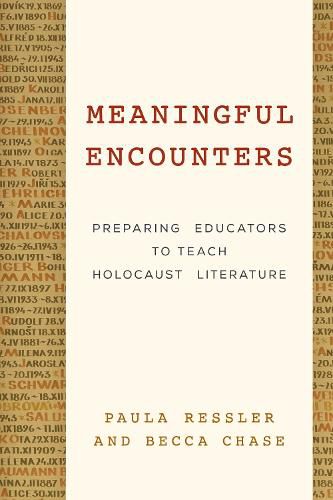Readings Newsletter
Become a Readings Member to make your shopping experience even easier.
Sign in or sign up for free!
You’re not far away from qualifying for FREE standard shipping within Australia
You’ve qualified for FREE standard shipping within Australia
The cart is loading…






Teaching about the Holocaust presents one of the most formidable challenges teachers face. Meaningful Encounters is Paula Ressler and Becca Chase’s contribution to the efforts of those educators who wish to meet this challenge more knowledgeably and effectively. It tells the story of a unique, inquiry-based English teacher education course focused on Holocaust literature from several genres that integrated literacy pedagogies and literary criticism with historical, philosophical, psychological, and political theories and contexts.
The book involves the reader in the complicated tangle of Holocaust education, critically illuminating how difficult this work is, but also demonstrating how teachers can introduce their students responsibly and ethically to this perennially relevant body of literature. The authors offer no facile solutions to the obstacles and pitfalls inherent in teaching this literature. They raise questions, pose problems, consider and analyze how participants responded to issues that emerged, and suggest alternative approaches.
The authors recount the students’ and teacher’s unsettling and enlightening experiences, failures, and successes. By following along, preservice educators will be able to conceptualize, discuss, and practice, and inservice teachers and teacher educators rethink, how to teach Holocaust and other literatures about genocide and mass atrocities in culturally relevant and meaningful ways today.
$9.00 standard shipping within Australia
FREE standard shipping within Australia for orders over $100.00
Express & International shipping calculated at checkout
Teaching about the Holocaust presents one of the most formidable challenges teachers face. Meaningful Encounters is Paula Ressler and Becca Chase’s contribution to the efforts of those educators who wish to meet this challenge more knowledgeably and effectively. It tells the story of a unique, inquiry-based English teacher education course focused on Holocaust literature from several genres that integrated literacy pedagogies and literary criticism with historical, philosophical, psychological, and political theories and contexts.
The book involves the reader in the complicated tangle of Holocaust education, critically illuminating how difficult this work is, but also demonstrating how teachers can introduce their students responsibly and ethically to this perennially relevant body of literature. The authors offer no facile solutions to the obstacles and pitfalls inherent in teaching this literature. They raise questions, pose problems, consider and analyze how participants responded to issues that emerged, and suggest alternative approaches.
The authors recount the students’ and teacher’s unsettling and enlightening experiences, failures, and successes. By following along, preservice educators will be able to conceptualize, discuss, and practice, and inservice teachers and teacher educators rethink, how to teach Holocaust and other literatures about genocide and mass atrocities in culturally relevant and meaningful ways today.